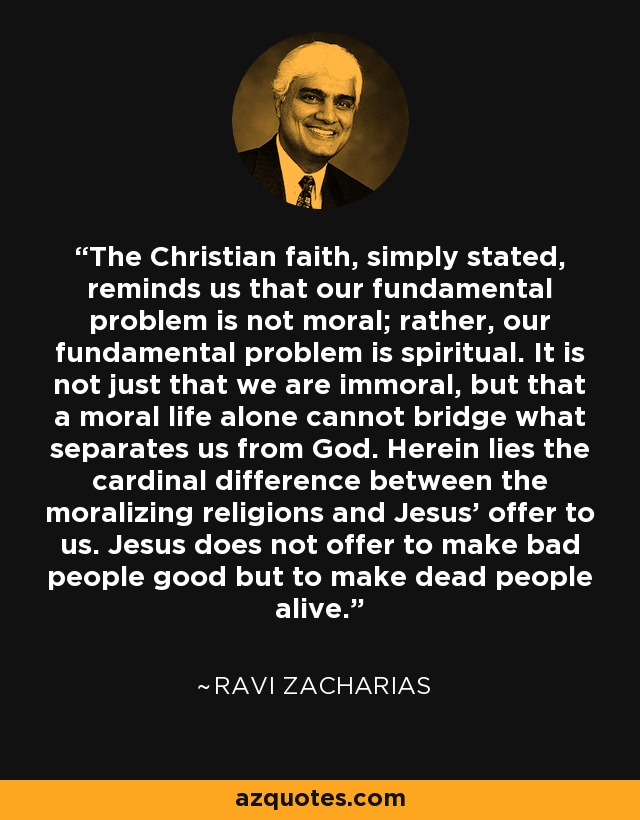I was puzzlingly enthused, encouraged and perplexed by Dr. John Piper’s response to Lecrae’s recent interview on Truth’s Table. Immediately, I realized that Dr. Piper’s response could be so more than that. It could actually be a seed that could sprout into dialogue and action that are both sorely needed, centering on the major question he asks in his blog post: “What are the implications when young black men and women state they are loosening ties with white evangelicalism?” I can’t speak for everyone, but I’ll share my insights in hopes of continuing this incredibly important issue.

Why was I so enthusiastic about the post? My journey into ‘white evangelicalism’ had largely been a one-way street. Like many young black men and women who have found Jesus and been nurtured in the context of this particular movement, I have imbibed deeply of its fountains. White evangelicalism’s heroes became my own and the institutions they have built, have become those in which we have served. I have been serving with one of the largest of such organizations for 17 years- practically my entire adult life. Young black folks have embraced the teachings, proclaimed them passionately and studied the debates astutely. We have embraced the declarations of the Reformation, the Confessions, and Creeds. We have defended them against any adversary even when they were at odds with our own traditional black churches. Though many in our own communities have criticized and questioned our loyalty when we have raised financial support to join the missionary and church planting movements launched by white evangelical entities completely foreign (and often historically hostile) to our people, we pressed on- determined to serve Jesus and believe in the best of our white brothers and sisters. Our faith in them was often was in the face of evidence to the contrary as we were consistently stereotyped, and misjudged and held to different standards than others. Young, black Christians who hold to the same creedal confessions of evangelicalism rarely experience someone of Dr. Piper’s platform, influence or credibility in white evangelicalism engaging us on our terms. In that context, his listening was very meaningful. Using his platform to comment on what he heard was even more significant. Why? Because we’re used to the exact opposite. Normally, our voices and words have been ignored in dealing with issues of race, justice, and unity in the church. Truth’s Table wasn’t celebrated but attacked when the groundbreaking podcast first aired. The hosts, Ekemini Uwan, Dr. Christina Edmonson, and Michelle Higgins were called out, not called upon to share their insights. Similarly, Jemar Tisby, who co-hosts the Pass The Mic podcast has been castigated for speaking on racial issues. Even someone like Dr. Eric Mason, with all the bona fides of Dallas Theological Seminary, Acts 29, books and countless other ‘white evangelical’ credentials still finds himself wondering aloud why people question his loyalty to the Gospel when talks about race. I’m grateful that Dr. Piper broke from this trend and actually listened because white evangelicalism seldom has listened to us.



Why was I encouraged? When the rare moment occurs that those of us “young black women and men” experience engagement from ‘white evangelicalism’ it is often the type that is dismissive. If we had a dollar for every time someone chastised us to just “focus on the gospel” when we bring up the significance of doing anti-racism work, none of us would have to raise support anymore. Dr. Piper not only listened in on the conversation, but he chose to emphasize that which he was thankful and hopeful for instead of being critical. That was very encouraging especially because he didn’t necessarily agree with all that he heard or read … or even understand it. But he offered Lecrae enough respect to listen and celebrate what he did grasp. That gave me hope. He set a tone that makes it more likely that others will follow suit because he is a respected elder in the tribe.
Why was I perplexed? I am grateful that Dr. Piper spent his personal capital to essentially support Lecrae on his blog but found it puzzling he pushed back on the term “white evangelicalism” commenting it “puts too many whites in bed together” and therein lies my perplexion. Young black women and men didn’t put white evangelicals in bed together … they put themselves there! Ironically, Lecrae addresses this in “FACTS”, the second track on his new album, All Things Come Together:
They say, “‘Crae, you so divisive, shouldn’t be a black church”
I say “Do the math, segregation started that first!”
Doctrinally speaking, the Barna Group has both clarified and described the murkiness in how the term “Evangelicalism” is used. Broadly speaking, this Wikipedia definition is helpful: Evangelicalism “is a worldwide, trans-denominational movement within Protestant Christianity which maintains the belief that the essence of the gospel consists of the doctrine of salvation by grace through faith in Jesus Christ‘s atonement.”[1]
What about the white evangelicalism? White evangelicalism is real and is rooted in the historical heresy of white supremacy. One can not discuss the American church without discussing slavery, segregation, and racism. It was St. George’s Methodist Church in Philadelphia that sinfully insisted on segregating its congregation. Richard Allen, refusing to endure the false doctrine of white supremacy, left the segregated ‘fellowship’ and started the African Methodist Episcopal Church in 1789. It was the Southern Baptist Convention which separated from the Triennial Convention in 1844 rather than turn away from its members’ idol of slavery. The National Baptist Convention started in 1866 by Black Baptists, who rejected this false teaching and practice, is the reaction to this idolatrous racism. And of course, it was the white Christian leaders who strongly criticized Dr. Martin Luther King Jr. for demanding that the doctrine of Imago Dei be lived out in this nations laws, practices and churches. It was to them that he wrote the Letter from a Birmingham Jail. Time does not permit us to detail how “white flight”, targeted marketing, and the rejection of those who speak about racism have all contributed to the creation of ‘white evangelicalism’. The racial divide in the church is not only a historical vestige of slavery, but a result of continued practices that marginalize people of color in the Christian community. White evangelicalism has been cultivated and crafted to be just that. It’s not a historical accident. Those people of color who are passionate about racial justice who stay among this tribe do so in spite of it. They stay affiliated supremely aware they must carefully eat the meat of epistemological fidelity and spit out the bones of ethical infidelity and racism, and this is a particularly bony fish. The movement that often syncretizes American exceptionalism and uncritical patriotism with what it means to be Christian is White Evangelicalism. The movement that openly speculated that the first black president was the anti-Christ is White Evangelicalism. The movement that overwhelmingly was silent when a presidential candidate they endorsed race-baited and pandered to white supremacists is White Evangelicalism. The movement that ignores issues of justice and the crisis that black people are suffering at higher rates than whites in just about every measurable way is White Evangelicalism. It’s a movement that too often neglects to identify the socio-economic realities that our Scriptures clearly link with injustice and therefore is one that many of us have decided to discontinue identification with.
Those people of color who are passionate about racial justice who stay among this tribe do so in spite of it. But because it is hyper-individualism, white evangelicalism is predictably unaware of itself or of its importance.
What’s a recognized global leader in ‘white evangelicalism’ to do? I celebrate Dr. Piper’s post. He thought the sentiments of what Lecrae shared on Truth’s Table was worth celebrating and pondering. But more needs to be done. White Christians like Dr. Piper must press into this issue of “white evangelicalism”. If dynamic young African American Christian leaders are saying that the air is so toxic in this movement that they need to leave, perhaps an exploration and some type of assessment of their complaints are warranted? I implore anyone confused about the term ‘white evangelicalism’ and the reasons why many of us are disillusioned by it to look into history, learn and tell that story. Then change the story. Don’t just dismiss it, but explore it. It has already been reported that part of the reason for Lecrae’s decline in sales is because he is tackling issues of race and justice. (Album Sales is only one measure of success and this album has critical acclaim and unprecedented reach, it’s still a tangible indicator of Lecrae’s point). If you’re a white evangelical, buy the album, encourage others to do the same.
Still confused about the term ‘white evangelicalism’ and the reasons why many are disillusioned by it? Learn the history, tell that story, then change the story. Don’t dismiss it, explore it. (Recommended: books like Divided By Faith and Doctrine and Race) I say this as one who respects and appreciates Dr. Piper and not as a cynical critic. Lecrae and so many of others who also have given up attempting to scale the wall of white evangelicalism acceptance deserve more than thankfulness that they are still in the faith. They deserve advocacy from those on the other side of that wall. They are the Hellenistic Jewish widows with a complaint about the distribution of dignity and justice in Acts 6. Will white evangelical leaders, like the disciples did, call together those under their influence and see what must be done? If things don’t change, then more will continue to look for other places to be seen and heard because their calling is bigger than the confines of ‘white evangelicalism’. But wouldn’t it be awesome if white evangelicals actually tore down the walls of their own structures?










 The unique artistic direction that inspired The Talented Tenth contributed to his decision to depart from the wildly successful Reach Records empire (led by multi Grammy™ Award winning artist Lecrae), and cost Sho many of his fans who were uncomfortable with the racial and historical critiques the project addressed. Ironically though, after it’s release, the controversial police shootings of Michael Brown, Alton Sterling and others, along with the emergence of the Black Lives Matter movement brought these themes to the forefront of relevance. Now, many who rejected the socially conscious lyrics of The Talented Tenth eagerly yearn for the insights that The Narrative offers. Sho’s social justice advocacy (see
The unique artistic direction that inspired The Talented Tenth contributed to his decision to depart from the wildly successful Reach Records empire (led by multi Grammy™ Award winning artist Lecrae), and cost Sho many of his fans who were uncomfortable with the racial and historical critiques the project addressed. Ironically though, after it’s release, the controversial police shootings of Michael Brown, Alton Sterling and others, along with the emergence of the Black Lives Matter movement brought these themes to the forefront of relevance. Now, many who rejected the socially conscious lyrics of The Talented Tenth eagerly yearn for the insights that The Narrative offers. Sho’s social justice advocacy (see 










